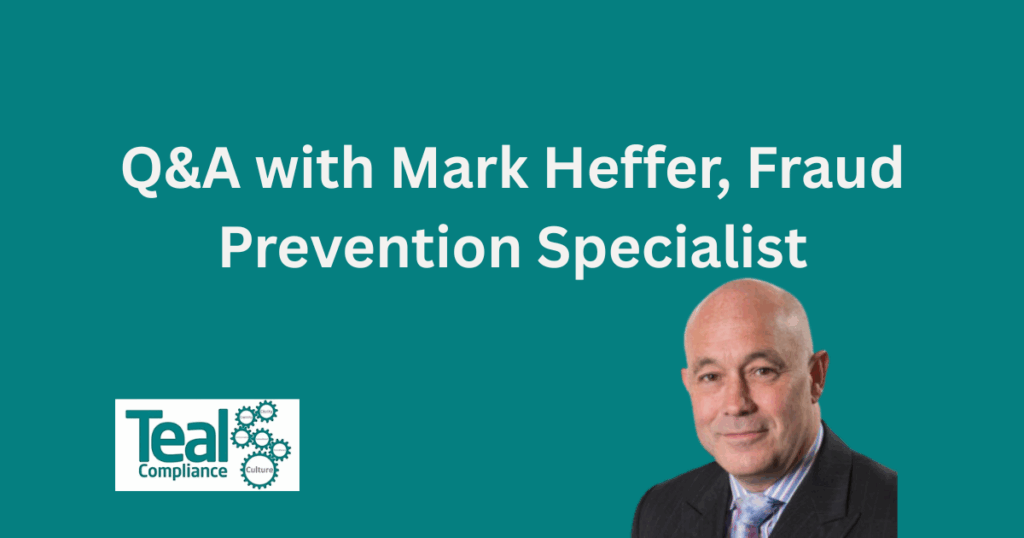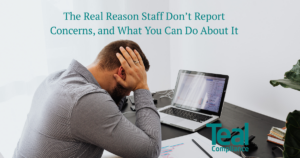By Elaine Pasini, Head of Marketing at Teal Compliance
On 2 July 2025, I had the pleasure of sitting down with our brilliant Fraud Prevention Specialist, Mark Heffer, for one of our favourite formats, a Coffee Conversation. This one was particularly important because we focused on something that’s going to affect every law firm in the UK: the new offence of Failure to Prevent Fraud.
We’ve had so many questions about this already, and I don’t blame anyone for feeling overwhelmed. It’s a big shift, and while the offence might not be “live” just yet, the need to act now is very real.
Here’s a round-up of what we talked about, what this means for law firms, and what you should be doing to stay ahead of the game.
What is the Failure to Prevent Fraud offence?
In a nutshell: under the Economic Crime and Corporate Transparency Act 2023, large organisations can be held criminally liable if an employee, agent or associate commits fraud for the organisation’s benefit, and the organisation didn’t have reasonable procedures in place to prevent it.
Mark explained it really well:
“This isn’t about catching people out after the fact. It’s about making sure you’ve done enough to stop fraud happening in the first place.”
And although it’s currently aimed at “large organisations” (based on thresholds for turnover, employees, and balance sheet), the SRA and other regulators are already nudging all firms to take proactive steps. We think it’s only a matter of time before smaller firms fall into scope, whether through law changes or the SRA’s own rules on risk management.
⚠️ Why fraud prevention matters to law firms now
We talked about the perception that law firms are somehow “safer” from this type of offence because they already deal with compliance. But as Mark pointed out, fraud often involves the trusted insider. Think about the roles that handle:
- Client money
- Billing and payments
- Property transactions
- Third-party disbursements
- Accounts and finance
If fraud happens in those areas (and your firm can’t show you had proper training, controls, and oversight) you could be in the firing line.
✅ Key Takeaways from the Conversation
Here’s a quick summary of the most important messages that came out of our chat:
1. This offence is real, and it’s coming
The legislation has already passed. While we’re waiting for implementation, the time to act is now. The government will expect firms to have reasonable prevention measures in place before the offence kicks in.
2. Fraud prevention ≠ AML compliance
Mark was clear on this: don’t assume your anti-money laundering policies cover this. Fraud is broader. It includes false representations, abuse of position, and failing to disclose information, often in situations that feel routine.
3. Start with a fraud risk assessment
You can’t prevent what you haven’t identified. Ask yourself:
- Where are we vulnerable?
- Who has access to funds or financial authority?
- How do we spot red flags?
This doesn’t need to be overwhelming. It just needs to be structured and documented.
4. Training is non-negotiable
Everyone, from senior partners to reception staff, should understand:
- What fraud looks like
- How to report concerns
- Why they’re personally responsible
“Fraud prevention is everybody’s business. If it’s left to the MLRO alone, it won’t work.”
Mark Heffer
Q&A Highlights – What Firms Wanted to Know
The questions at the end of the session were fantastic. Here are a few that stood out:
Q: “If we’ve done AML training, do we need separate fraud training?”
A: Yes. AML training doesn’t cover the full scope of fraud risks under this offence. Fraud training needs to address broader criminal behaviours and organisational controls.
Q: “Does this apply to sole practitioners?”
A: Technically, not under the current thresholds. But regulators are looking for evidence of fraud awareness and risk mitigation across the board. It’s good practice regardless of size.
Q: “What if the fraud was committed by a contractor, not an employee?”
A: The offence still applies if the fraudster was acting on behalf of the organisation. That includes agents and associates, which is why due diligence on your suppliers and referral networks matters.
What next? Book a Fraud Audit or Training Session
If this has got you thinking (and we hope it has), now’s the perfect time to take action. We’re already helping law firms with:
- Fraud risk assessments
- Bespoke fraud training
- Internal control audits
- Policy and procedure reviews
And you don’t have to wait for the offence to be enacted, in fact, it’s far better if you don’t.
👉 Book your Fraud Audit or Training with us at Teal Compliance and make sure your firm is ready before the regulator comes knocking.
Got questions? Need help figuring out your next steps? Drop me or one of my colleagues a message. Gary Yantin is our go-to problem solver!




